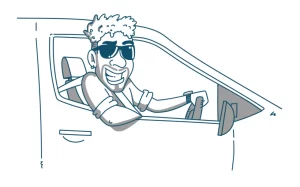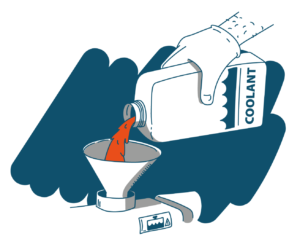Check what you know
Did you know?
More info
Check what you know
Did you know?
- Hot weather can cause fatigue and irritability to drivers.
- Drivers can become easily dehydrated and it can affect their driving abilities.
- Drivers experience increased congestion from high levels of traffic on holiday routes.
![]()
Loose chippings are a common sight on roads in the summer, they can cause cracked headlamps and windscreens, and damage paintwork. Stick to temporary speed limits as advised by road signage.
- drinking water
- snacks that won’t be affected by heat
- fully charged mobile phone and charger
- a hat
- sunglasses
- sun block
- any emergency medication you may need
More info
- Check travel and weather conditions before setting out and, where it’s safe to do so, during the journey.
- Allow plenty of time your journey and plan to take 15 minute breaks every two hours.
- Keep a bottle of water in the vehicle, as you only need to be 1% dehydrated to experience a 5% drop in cognitive function.

- Keep windscreens clean as dirt and marks can amplify sun glare. Have access to – and wear – a clean pair of sunglasses while driving.
- Stay alert. The number of people on the roads in the summer increases. They may be unfamiliar with the roads they are travelling on, causing confusion, and therefore be more likely to make sudden turns or U-turns.
- Drive extra carefully after rain, as it can turn dry surfaces into a skid area. Roads can be extra slippery when it rains after a long period of dry weather.
 Keep the vehicle’s coolant topped up to reduce the chance of it overheating and turn the engine off when stuck in traffic as this too will prevent it from overheating.
Keep the vehicle’s coolant topped up to reduce the chance of it overheating and turn the engine off when stuck in traffic as this too will prevent it from overheating.- Regularly check tyre pressures and condition as the higher temperatures of summer increase tyre pressure that could lead to the risk of tyre blowout.
In hot weather, vehicles may sometimes give unnecessary cause for concern. Here are are some examples:
- Pools of water under a vehicle which are caused by condensed water from the air conditioning system.
- Vapour from air vents is just water vapour produced by the air conditioning unit that has not had time to condense.
- Roaring from the engine bay is often the cooling fan turning on and off.
- If a vehicle seems to have less power, this is probably because the air is warmer and less dense, resulting in the engine being less efficient.
Categories


Crown Copyright 2025
You may re-use this information (not including logos) free of charge in any format or medium, under the terms of the Open Government Licence.
To view this licence, visit www.nationalarchives.gov.uk/doc/open-government-licence
 Keep the vehicle’s coolant topped up to reduce the chance of it overheating and turn the engine off when stuck in traffic as this too will prevent it from overheating.
Keep the vehicle’s coolant topped up to reduce the chance of it overheating and turn the engine off when stuck in traffic as this too will prevent it from overheating.